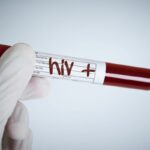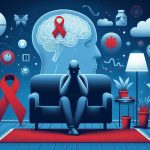Individuals living with HIV can experience a range of symptoms, including weight loss, which is one of the most prevalent.In this article, we will be looking at the link between weight loss and living with HIV, as well as how you can treat it efficiently.

What You Need To Know About Hiv-Related Weight Loss
Weight loss due to HIV – also known as HIV wasting syndrome – is described as an unanticipated weight loss of more than 10% of your body weight, accompanied by diarrhea, weakness, and/or a fever that typically lasts longer than 30 days.
This form of weight loss is more common in those who have advanced HIV (see also ‘Where Did HIV Come From?‘). The loss of lean body mass (LBM) is common with HIV wasting syndrome, but body fat loss can also occur.
In patients infected and living with HIV, the chance of death rises by 1% for every pound lost from their starting weight. Furthermore, each 1% increase in weight loss from the previous occasion increases the overall risk by 11%.
Is Weight Loss Always A Symptom Of Hiv?
Weight loss is a typical adverse effect of living with HIV, with 14 percent to 38 percent of HIV patients developing HIV wasting syndrome.
A 5% drop in body weight is linked to an increased risk of HIV progression in those living with the virus (e.g., in a 200-pound person, that would result in a 10 pound (4.54 kg) weight decrease). As a result, it’s critical for persons living with HIV to maintain their weight and manage any weight loss as quickly and efficiently as possible.
When Does Hiv Weight Loss Begin?
When the CD4 count falls below 200 cells/mm3, hunger loss and weight loss are common. Between the conclusion of the asymptomatic stage and the start of the AIDS stage, it is common for weight loss to begin to occur.
Weight loss is also prevalent in the last stages of AIDS, sometimes known as terminal AIDS. The decrease in CD4 cells and rise in viral load causes a reduction in the ability to ingest and digest food, which often results in significant weight loss.
Why HIV Can Cause People To Lose Weight
Change In Metabolism And Hormones
Resting energy expenditure (REE), or the number of calories burnt at rest, can be increased by HIV. So, while one of the main causes of HIV weight loss is a low calorie diet, REE can speed up the process.
HIV may alter the levels of hormones needed to maintain weight and grow and repair muscles, which might affect metabolism. Thyroid hormones, testosterone, and growth hormones and factors are among these.
Hypogonadism – when the sex glands produce little or no sex hormones, e.g., testosterone – can also cause weight loss in some people.
OIs (Opportunistic Infections)
Since HIV weakens the immune system, opportunistic infections (OIs) might develop, resulting in weight loss.
OIs, including Mycobacterium avium complex, CMV infection, Pneumocystis pneumonia, and tuberculosis, have all been linked to HIV wasting.
Lipodystrophy
Lipodystrophy, or the transfer of fat from one part of the body to another, is a side effect of some HIV medications. This could result in fat loss in certain areas like the arms, legs, face, and legs, but fat growth in others, in areas such as the stomach, shoulders, chest, and neck area.
Side Effects From Medication
Certain HIV drugs, such as antiretroviral therapy (ART), can produce nausea and vomiting, as well as a loss of appetite. Interactions of medication can cause these drugs’ blood levels to rise, exacerbating the problem.
Poor Mental Health
The burden of living with HIV can be devastating to one’s mental health, which, in turn, can result in weight loss. Depression, substance use disorder, and HIV-associated dementia are among the mood, anxiety, and cognitive disorders that HIV patients may experience.
Certain antiretroviral drugs might have negative side effects that affect how people think and act. As a consequence, they may eat fewer healthful items or eat them less frequently.
Nutritional Changes
Due to mouth sores, chewing and swallowing can become difficult for a person living with HIV, and feeling full quickly due to gastrointestinal (GI) tract difficulties might limit food consumption.
Food intake, as well as the impression of hunger and the ability to eat, can be affected by neurologic disease, such as cryptococcal meningitis. Furthermore, HIV and OIs can cause the membrane of the small intestine to break down, limiting the amount of nutrients obtained.
How To Prevent Weight Loss If You Have Hiv
When it comes to preventing weight loss while living with HIV, there are some measure that can be taken.
Some of these include:
- Consuming a nutritious diet with a decent balance of calories and nutrients, such as protein.
- Working out and exercising regularly to build up muscle.
- Discussing options with a medical professional.
- Getting in touch with a certified dietician for assistance in developing an eating pattern and increasing daily calories in a safe and healthy manner.
- Focusing on eating bland, plain foods in attempt to avoid nausea, vomiting, and diarrhea.
- Avoiding spicy, sour, or particularly salty foods to avoid discomfort while eating with mouth sores.
How To Treat Weight Loss If You Have Hiv
There are a couple of techniques that can help with weight loss if you have already begun to lose a considerable amount of weight.
To combat loss of appetite and stimulate weight gain, appetite stimulants such as Remeron, Megace, and Marinol – an artificial variant of a chemical present in cannabis – are an alternative to consider.
If nausea and vomiting are interfering with your ability to eat, anti-nausea medications like Zofran and Compazine can help. If you have a lot of nausea, these medications can help you feel better.
Final Thoughts
HIV wasting, otherwise known as weight loss, is a major health problem that generally develops later in the course of the disease. OIs, dietary and gastrointestinal disorders, HIV treatment side effects, and mental health conditions can all play a part in how and why it develops. However, there are ways to tackle unwanted weight loss, including certain medications and therapies.
- Understanding Male Reproductive Health: A Complete Guide - February 2, 2025
- Simple Healthy Skin Habits for Radiant Skin - December 6, 2024
- Unlocking the Connection Between Nutrition and Mental Health - December 3, 2024








